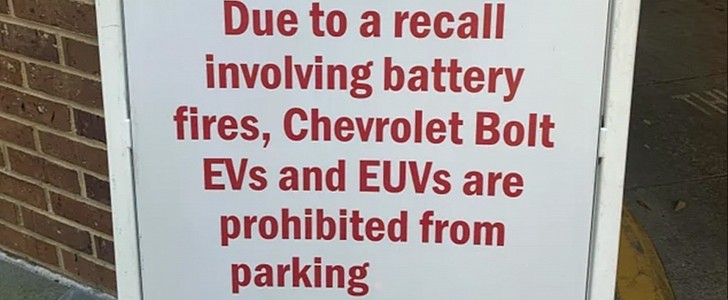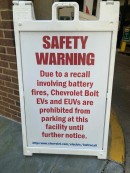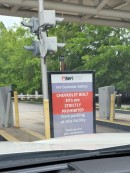Chevrolet Bolt owners are still “discriminated” against in some public places when it comes to parking. A user on Reddit found a sign that apparently has been on display since 2021. While it’s no huge inconvenience to park somewhere else if you actually pose a safety risk, this whole situation might be deeper than it seems at first glance.
You’ve probably heard of EVs catching fire left and right by now. Some time ago, the Chevy Bolt was kind of the poster child for the flaming phenomenon. There was a huge scandal where Chevrolet first tried to downplay the thing with a software fix for a hardware problem.
Also at first, the company basically denied a need for recalls. You can imagine that led to some frustration not only from Chevy owners but from all sides.
During the Bolt recall that inevitably came after, Chevrolet started giving out “Chevrolet Certified” stickers as proof that the vehicle no longer posed the threat of spontaneously combusting.
Now, back to the sign, given that during the scandal, Chevy itself came out with instructions saying, “Park your vehicle outside immediately after charging and do not leave your vehicle charging indoors overnight,” who could blame the people who are still afraid and just want to take extra precautions? (As long as said precautions are civilized and peaceful.)
Indeed, GM publicly stated that the problem has been solved since September of last year, but does that mean that everyone that puts up a sign like that also has the responsibility to keep up to date with the situation? If so, then should they 100% believe a company’s statement at face value?
The line between right and wrong here is blurred, to say the least, with no clear denominator. Because, on the one hand, this problem appears to have been solved, but on the other hand, we’re dealing with human emotions of fear and distrust that don’t just go away via a simple PR statement. Especially not after seeing the state of the vehicles after they caught fire.
A similar sign-related scenario was posted in the comments saying that “My parking garage in Tulsa also banned the Bolt. Sucks 'cause I was going to get one but not if I can’t park in my parking garage at work."
This is indeed a bit of a pickle. Given that we're living in a consumer-centric society, does this affect the freedom of that person in any way? Does a sign have the right to influence one's life in such a way? We're not talking nickels and dimes here, after all.
Another user wrote, “We saw a permanently mounted sign like that at the parking garage when we visited the Shedd Aquarium in Chicago last summer. It put my wife off of buying a Bolt, which we had test-driven a week or two earlier. Almost makes me want to go back in ten years to see if the sign is still there.”
The same discussion could be raised here. Is that sign infringing on the person’s right to buy property? Or is it that it’s better overall because buying potentially faulty and risky things could have devastating consequences?
To me, this issue seems much larger and more profound, requiring a much better answer than I could devise on my own.
The way I see it, we’re in the early days of the electric vehicle. Obviously, there are lots of kinks to iron out. The ICE has been around since Karl Benz came out with the "Motorwagen," in 1886.
Most probably in 50 years, when most of us won’t still be around, these issues would have been solved and forgotten. That's not to say that today is any less important.
Also, given that these issues are not just skin-deep, apparently, perhaps these cases are best dealt with by those who have the authority to pass laws, so nothing would be left to personal interpretation.
Also at first, the company basically denied a need for recalls. You can imagine that led to some frustration not only from Chevy owners but from all sides.
During the Bolt recall that inevitably came after, Chevrolet started giving out “Chevrolet Certified” stickers as proof that the vehicle no longer posed the threat of spontaneously combusting.
Now, back to the sign, given that during the scandal, Chevy itself came out with instructions saying, “Park your vehicle outside immediately after charging and do not leave your vehicle charging indoors overnight,” who could blame the people who are still afraid and just want to take extra precautions? (As long as said precautions are civilized and peaceful.)
Indeed, GM publicly stated that the problem has been solved since September of last year, but does that mean that everyone that puts up a sign like that also has the responsibility to keep up to date with the situation? If so, then should they 100% believe a company’s statement at face value?
The line between right and wrong here is blurred, to say the least, with no clear denominator. Because, on the one hand, this problem appears to have been solved, but on the other hand, we’re dealing with human emotions of fear and distrust that don’t just go away via a simple PR statement. Especially not after seeing the state of the vehicles after they caught fire.
A similar sign-related scenario was posted in the comments saying that “My parking garage in Tulsa also banned the Bolt. Sucks 'cause I was going to get one but not if I can’t park in my parking garage at work."
This is indeed a bit of a pickle. Given that we're living in a consumer-centric society, does this affect the freedom of that person in any way? Does a sign have the right to influence one's life in such a way? We're not talking nickels and dimes here, after all.
Another user wrote, “We saw a permanently mounted sign like that at the parking garage when we visited the Shedd Aquarium in Chicago last summer. It put my wife off of buying a Bolt, which we had test-driven a week or two earlier. Almost makes me want to go back in ten years to see if the sign is still there.”
The same discussion could be raised here. Is that sign infringing on the person’s right to buy property? Or is it that it’s better overall because buying potentially faulty and risky things could have devastating consequences?
To me, this issue seems much larger and more profound, requiring a much better answer than I could devise on my own.
The way I see it, we’re in the early days of the electric vehicle. Obviously, there are lots of kinks to iron out. The ICE has been around since Karl Benz came out with the "Motorwagen," in 1886.
Most probably in 50 years, when most of us won’t still be around, these issues would have been solved and forgotten. That's not to say that today is any less important.
Also, given that these issues are not just skin-deep, apparently, perhaps these cases are best dealt with by those who have the authority to pass laws, so nothing would be left to personal interpretation.








